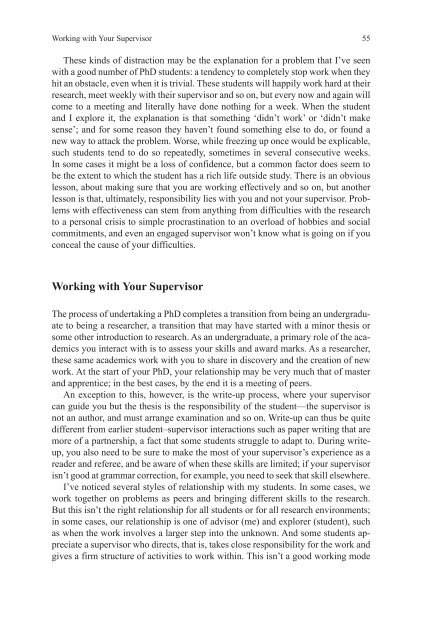How-to-Write-a-Better-Thesis
Create successful ePaper yourself
Turn your PDF publications into a flip-book with our unique Google optimized e-Paper software.
Working with Your Supervisor <br />
55<br />
These kinds of distraction may be the explanation for a problem that I’ve seen<br />
with a good number of PhD students: a tendency <strong>to</strong> completely s<strong>to</strong>p work when they<br />
hit an obstacle, even when it is trivial. These students will happily work hard at their<br />
research, meet weekly with their supervisor and so on, but every now and again will<br />
come <strong>to</strong> a meeting and literally have done nothing for a week. When the student<br />
and I explore it, the explanation is that something ‘didn’t work’ or ‘didn’t make<br />
sense’; and for some reason they haven’t found something else <strong>to</strong> do, or found a<br />
new way <strong>to</strong> attack the problem. Worse, while freezing up once would be explicable,<br />
such students tend <strong>to</strong> do so repeatedly, sometimes in several consecutive weeks.<br />
In some cases it might be a loss of confidence, but a common fac<strong>to</strong>r does seem <strong>to</strong><br />
be the extent <strong>to</strong> which the student has a rich life outside study. There is an obvious<br />
lesson, about making sure that you are working effectively and so on, but another<br />
lesson is that, ultimately, responsibility lies with you and not your supervisor. Problems<br />
with effectiveness can stem from anything from difficulties with the research<br />
<strong>to</strong> a personal crisis <strong>to</strong> simple procrastination <strong>to</strong> an overload of hobbies and social<br />
commitments, and even an engaged supervisor won’t know what is going on if you<br />
conceal the cause of your difficulties.<br />
Working with Your Supervisor<br />
The process of undertaking a PhD completes a transition from being an undergraduate<br />
<strong>to</strong> being a researcher, a transition that may have started with a minor thesis or<br />
some other introduction <strong>to</strong> research. As an undergraduate, a primary role of the academics<br />
you interact with is <strong>to</strong> assess your skills and award marks. As a researcher,<br />
these same academics work with you <strong>to</strong> share in discovery and the creation of new<br />
work. At the start of your PhD, your relationship may be very much that of master<br />
and apprentice; in the best cases, by the end it is a meeting of peers.<br />
An exception <strong>to</strong> this, however, is the write-up process, where your supervisor<br />
can guide you but the thesis is the responsibility of the student—the supervisor is<br />
not an author, and must arrange examination and so on. <strong>Write</strong>-up can thus be quite<br />
different from earlier student–supervisor interactions such as paper writing that are<br />
more of a partnership, a fact that some students struggle <strong>to</strong> adapt <strong>to</strong>. During writeup,<br />
you also need <strong>to</strong> be sure <strong>to</strong> make the most of your supervisor’s experience as a<br />
reader and referee, and be aware of when these skills are limited; if your supervisor<br />
isn’t good at grammar correction, for example, you need <strong>to</strong> seek that skill elsewhere.<br />
I’ve noticed several styles of relationship with my students. In some cases, we<br />
work <strong>to</strong>gether on problems as peers and bringing different skills <strong>to</strong> the research.<br />
But this isn’t the right relationship for all students or for all research environments;<br />
in some cases, our relationship is one of advisor (me) and explorer (student), such<br />
as when the work involves a larger step in<strong>to</strong> the unknown. And some students appreciate<br />
a supervisor who directs, that is, takes close responsibility for the work and<br />
gives a firm structure of activities <strong>to</strong> work within. This isn’t a good working mode














![[Lonely Planet] Sri Lanka](https://img.yumpu.com/59845622/1/169x260/lonely-planet-sri-lanka.jpg?quality=85)


